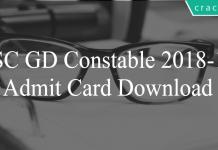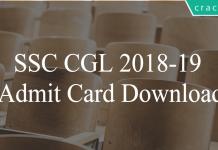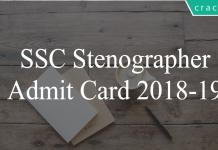Contents
General Awareness for SSC CGL:
General awareness is one of the 4 sections in the Tier 1 exam of SSC CGL. The section contains 25 questions of 2 marks each – amounting to a total of 50 marks. Since SSC has reduced the time limit for Tier 1 exam from 75 minutes to 60 minutes, scoring well in this section is paramount. In this blog, we try to give you a fair idea of how to prepare General awareness for SSC CGL.
The syllabus of General Awareness for SSC CGL is vast. Hence, aspirants must start their preparations for this section early since candidates cannot expect to study the entire GA section within a week. Aspirants can opt for SSC CGL online preparation to aid in their preparation.
SSC sometimes even repeats GA questions from the past papers. Hence, it is necessary for aspirants to practise previous year papers of SSC CGL. Also, aspirants must try to score above 30 in this section so that they can invest their time in other sections during the exam.
100 SSC CGL (latest pattern mocks) – Rs. 199
SSC CGL Free Study Material – 18000 Questions
Aspirants can take SSC CGL mock tests to have an idea about how to draft a strategy for the paper.
How to prepare General Awareness for SSC CGL
General Awareness for SSC CGL can be broadly classified into 3 topics.
(i) General Science
(ii) Static GK
(iii) Current Affairs
General Science:
Questions from these topics are from NCERT books. Hence, it is recommended to read NCERT books from class 6th to class 12th. However, if you are running out of time, read from books such as Lucent’s general knowledge.
Aspirants can read about general science for SSC CGL to get a detailed overview of the section.
General Science comprises 7 sub-topics. They are
1.Physics
2.Chemistry
3.Biology
4.History
5.Geography
6.Economics
7.Polity
Note: The topics given below are indicative and in no way exhaustive.
Download General Science Notes PDF
Physics:
Start by revising school physics books. Make sure you are thorough with basic concepts such as optics, mechanics, thermodynamics and fluid mechanics.
Also, study the various laws and equations of motion, reflection, refraction, total internal reflection, first and second laws of thermodynamics, projectiles, conservation of energy – momentum, mass-energy equivalence, electromagnetism, etc.
Chemistry:
Be thorough with reactions of economic significance. Also, read about the periodic table and classification of elements. Learn about catalysts for various reactions.
Also, try to know the chemical names of household items such as baking soda, washing soda, quick lime, slackened lime, caustic soda, etc. Biochemical reactions such as photosynthesis are very important.
Remember, commercial applications of chemical reactions are very important.
Download SSC CGL Important Questions PDF
Biology:
Again, NCERT books are the best sources to learn from. Learn about binary classification system, plant and animal derivatives, their commercial and medicinal applications, various types of ecosystems, etc.
Remember epidemics, their vectors and parasites are very important. Also, various organs and systems of the body, functions of glands, the structure of cells, nutrient requirements of the body are important.
History:
Ancient history, Medieval history and Modern history are 3 subtopics of history. SSC asks questions mostly from Indian history.
Ancient history is the period when various civilisations rose and fell. Medieval history is the period of Guptas, Maghadhas, Mughals, Delhi sultanates, Nizams of Hyderabad, Bahmani and Vijayanagar kingdoms, Marathas, etc.
Also, aspirants must be thorough with the various wars that led to the ascent and fall of various dynasties.
Modern history consists of the period from the advent of the colonial powers to till date. Remember, modern history has the maximum weightage followed by medieval history.
Read about how to prepare for history of SSC CGL
Geography:
Learn about various seasons, the structure of the Earth, rock formation mechanism, various natural cycles, various mountains, plateaus and plains, various layers of the atmosphere, seasonal winds, etc.
Since most of the questions will be from Indian Geography, it is essential to be thorough with it. Hence, learn about the Himalayas, their climatic and economic significance, Western and Eastern Ghats, Deccan, Malwa and Chota Nagpur plateaus. Also, learn about major rivers and dams, natural disasters such as earthquakes, tsunamis, volcanic eruptions, etc.,
Economics:
Most of the questions asked are from the fundamental definitions such as GDP, GNP, NDP. Hence, aspirants must be thorough with these definitions.
Again, reading NCERTs will suffice for this section. Also, some questions make their appearance from the budget, fiscal deficits, India’s rankings, etc.
Polity:
Learn about the civic structure of India. Remember important schedules and amendments in the constitution. Powers of the President, Governor, VP, CM, PM are important.
Also, read about unicameral/bicameral systems, bills and laws, approvals required for a bill to become law, the difference between an ordinary bill and money bill, President’s power in sending bills back for reconsideration, writs and petitions, etc.
This section is intertwined with general sciences. While studying geography, learn about the largest dams, dams across rivers, longest rivers, largest rivers, longest coastlines, etc.
Download SSC CGL 2018 Syllabus PDF
Static GK:
Since the syllabus is vast in this section, learning superlatives will help immensely (Highest, tallest, largest).
Also, the subjects studied in general sciences form the basis for most of the static GK questions. Hence, being thorough with general sciences will help a lot.
Some of the commonly asked questions are from
1.Superlatives (Highest, Longest, first, largest, tallest, deepest)
2.Biospheres and National Parks
3.Sobriquets
4.Monuments and buildings of historic significance
5.Important roadways and railways
6.Countries, Currencies, and Capitals
7.States and their Capitals
8.Important revolutions
9.Wars and years
10.Padma and Bharat Ratna awardees
11.Nobel laureates
12.Important Mergers and Acquisitions
13.Military deals
14.Breakthrough inventions and their inventors
15.Diseases and their causes and cure
Current affairs:
The weightage of current affairs is very low in this section. Hence, candidates must read only about the important incidents as the benefit-cost ratio is very low.
Mostly, questions can be expected from very significant events in the recent past such as, Ranking Index, Union Budget, Important Appointments, Demonetization, etc.
Banking aspirants must entirely change their preparation for this exam as they would have focused entirely on current affairs. Remember, Static GK carries the maximum weightage in SSC exam. Hence, aspirants must make changes to their plan accordingly.
Download Current Affairs Capsule PDF
Download Daily/Monthly Current Affairs PDF
One of the major advantages of this section is that you know whether to attempt or leave a question just on glancing it. Hence, a lot of time is saved which can be put to productive use in other sections. Learn by practicing free test for GK for SSC exam.
The syllabus of General Awareness for SSC CGL is practically limitless. Hence, it is vital that aspirants have a realistic expectation from this section. Also, it is wise not invest too much time mastering this section as the marginal utility decreases drastically beyond a certain point.
SSC CGL Solved Previous papers
Read about how to prepare for General Science for SSC CGL
To know about English section, aspirants can read how to prepare for SSC CGL English section.
Read about History for SSC CGL preparation.






[…] 1 exam consists of 4 sections – general intelligence and reasoning, English language, general awareness, quantitative aptitude.The paper contains 100 questions each carrying 2 marks. Wrong answers carry […]